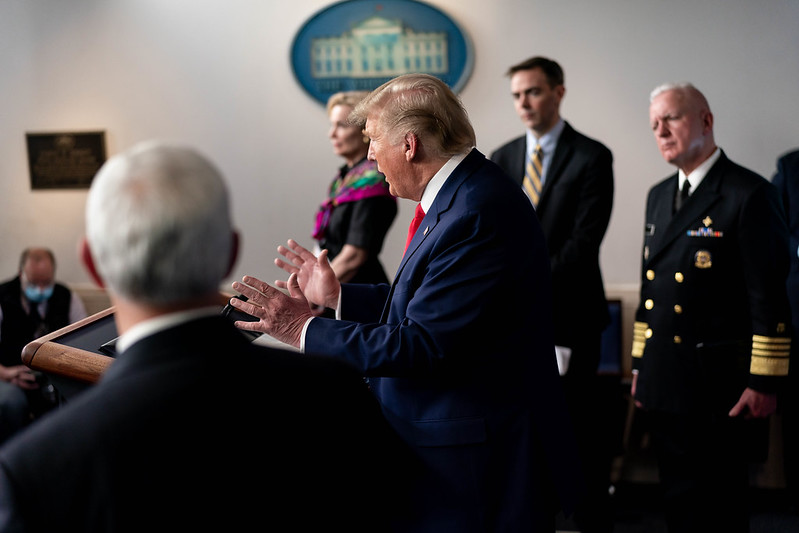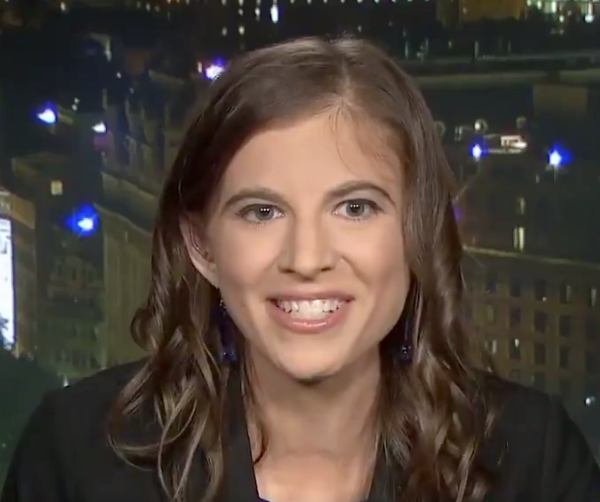Trump Can’t Play Politics With Aid to States
The Constitution forbids the Trump administration from allocating federal resources needed in the fight against the coronavirus to states based on politics or patronage.

Published by The Lawfare Institute
in Cooperation With

The national fight against the spread of the novel coronavirus demands a leader who can take charge of and defeat a grave threat, and who can put partisan politics aside to create a shared sense of national purpose. Instead, President Trump appears to be making—and is certainly threatening to make—decisions about how vital medical equipment should be distributed to states based at least in part on political considerations.
But, as we will explain in more detail below, the Constitution forbids the Trump administration from allocating federal resources needed in the fight against the coronavirus to states based on politics or patronage. The Take Care Clause requires the president to act for the benefit of all Americans, not just political allies. The Tenth Amendment prevents the president from conditioning states’ receipt of federal aid on their governors’ fealty to his administration. The Fifth Amendment prohibits the president from depriving states’ constituents of lifesaving medical resources in ways that shock the conscience and violate the decencies of civilized conduct. And the First Amendment prohibits the president from withholding assistance to states to punish either their governors for criticizing the president or residents of politically disfavored states for associating with an opposing political party.
The Public Record on Possible Discriminatory Allocation of Resources
While it is not yet clear whether the president has in fact withheld aid for the purpose of punishing political enemies or disbursed aid to cater to political allies, he has certainly threatened to do so. And there is growing evidence that he has carried out those threats to at least some extent.
Much of the current uncertainty stems from a near total lack of transparency about how and where aid is being disbursed, which creates a situation that both is ripe for abuse and makes any abuse difficult to pin down with certainty. The Federal Emergency Management Agency has failed to provide any public accounting of the basis on which it is distributing (and seizing) resources or a summary of the resources provided to various states to date. And without any clarity, it is impossible to know if and when the federal government is disbursing aid fairly. The Department of Health and Human Services—which initially oversaw the federal government’s response to the virus—suggested that it was distributing personal protective equipment (PPE) on the basis of population. But that policy did not apply to ventilators, and there’s nothing in the public record to confirm that the department actually disbursed PPE proportionate to population size.
Additionally, Trump has openly insulted Democratic governors who have publicly criticized him, calling Washington’s Jay Inslee a “snake” and Michigan’s Gretchen Whitmer “the woman in Michigan” and “half-Whit.” Worse, he has accompanied his insults with repeated suggestions that he would condition federal assistance to states based on politics and the willingness of governors to praise him. In one recent press conference, he claimed to have instructed Vice President Pence not to return the calls of unappreciative governors. He has accompanied approvals of requests for aid with shoutouts to his political friends, as he did with embattled Colorado Republican Sen. Cory Gardner—just days after he blocked Democratic Gov. Jared Polis from purchasing 500 ventilators. Democratic governors have also reported federal government interference with states’ market activity to procure necessary supplies from private vendors. On other occasions, Trump has reiterated the refrain that governors need to “treat us well” in order to get help for their residents.
Trump has also repeatedly told governors at the epicenter of the pandemic—most of them from blue states—that they don’t need the volume of equipment from the federal stockpile of ventilators and PPE that they have requested. In contrast, there’s evidence that the president is ensuring that states with Republican governors get what they ask for. Two days after vulnerable Arizona Republican Sen. Martha McSally communicated Gov. Doug Ducey’s request for 100 ventilators, the president delivered. And Trump provides for his political allies even when those governors are not complying with federal guidelines on mitigating the spread of the virus. Gov. Ron DeSantis of Florida, for example, who kept beaches open to crowds of spring break revelers and refused for weeks to issue a statewide stay-at-home order, has been the beneficiary of Trump’s favorable attention. “The president knows Florida is so important for his reelection,” one source told the Washington Post. “He pays close attention to what Florida wants.”
In the midst of a pandemic that may kill hundreds of thousands of Americans, any effort to use federal medical resources as a carrot or a stick to reward allies or punish enemies would be a grave and unconstitutional abuse of power.
Fortunately, emergency brakes are interspersed throughout the Constitution as restraints on the conduct of the president and the executive branch.
Constitutional Limits on Discriminatory Allocation of Federal Resources
Take Care Clause
The clause of the Constitution that is perhaps most directly responsive to the president’s conduct is the Take Care Clause, which imposes on the president a fiduciary duty to “take Care” that the laws are “faithfully executed.” This duty is, of course, echoed in the president’s constitutionally inscribed oath of office, in which the president swears to “faithfully execute the Office of President.” As a fiduciary of the American people, the president has two principal duties: a duty of care, which means a duty “to act with the care, competence, and diligence normally exercised” by someone in their position; and a duty of loyalty, which means a duty to act for the benefit of the American people rather than for the president’s own personal benefit. The Founders spoke of the duty of loyalty in terms of trusteeship; the president is a trustee of the office, the Constitution, and the laws, on behalf of all of the American people.
Any order to federal agencies or pressure on vendors to discriminate among states based on politics or personal fealty would violate both the president’s duty of care and his duty of loyalty. In these circumstances, the duty of care requires that the president diligently work to ensure the distribution of resources so as to effectuate relevant statutes (for example, the Stafford or CARES Acts) and advance the public good (for example, to reduce loss and suffering of the American population writ large); for the president to act on his insinuations that he will instead distribute aid based on political and personal allegiance would plainly lack the basic diligence and care required.
As with Trump’s withholding of aid to urge Ukraine to investigate his political rivals, withholding coronavirus aid from states based on politics would violate his duty of loyalty. The president’s repeated message to states that he will deny lifesaving federal aid to those whose governors are insufficiently reverent flips the duty of loyalty on its head. Rather than offering loyalty to the American people, Trump demands personal loyalty, and he is risking lives to get it. Of course, we’ve seen Trump run that play before: He did it with aid to Puerto Rico after Hurricane Maria and to California after its deadly wildfires.
Any discriminatory allocation of aid would violate the president’s duty of loyalty in another respect. The president owes this loyalty, at a bare minimum, to “[a]ll persons born or naturalized in the United States, and subject to the jurisdiction thereof,” regardless of the state where they live, the governor they elect or the presidential candidate for whom they vote. This principle is embedded throughout the Constitution, from its Equal Protection Clauses to the Domestic Emoluments Clause, which Alexander Hamilton explained was designed to prevent the president from “renounc[ing] or desert[ing] the independence intended for him by the Constitution” through, for example, states competing to “appeal[] to his avarice.”
The president’s duty of uniform loyalty to Americans in all states is also reflected in the Supreme Court’s equal sovereignty doctrine. The Supreme Court has long recognized that “the constitutional equality of the States is essential to the harmonious operation of the scheme upon which the Republic was organized.” Although the equal sovereignty principle does not operate as a bar on differential treatment of states outside the context of admittance to the union, it “remains highly pertinent in assessing subsequent disparate treatment of States.” In particular, the Supreme Court has said that a state may not be “singled out” for differential treatment absent a showing that this discrimination is “sufficiently related to the problem that it targets.” We think there are good reasons to believe the same principle applies when the federal government doles out resources to states that will mean the difference between life and death for states’ residents. In singling out for adverse treatment those states whose governors do not show sufficient fealty, the president would violate this duty of uniform loyalty.
Admittedly, whether the Take Care Clause is a judicially enforceable constraint on the president such that a Take Care claim presents a justiciable controversy is an open question. But the Supreme Court recently suggested that Take Care claims are justiciable. In United States v. Texas, the Supreme Court granted certiorari and of its own accord directed the parties to address whether the Department of Justice’s Deferred Action for Parents of Americans and Lawful Permanent Residents policy “violate[d] the Take Care Clause of the Constitution, Art. II, §3.” The court never reached the issue, as Justice Antonin Scalia died a month later and the court, equally divided, summarily affirmed the decision of the U.S. Court of Appeals for the Fifth Circuit.
We also note that impeachment provides the more traditional mechanism for enforcing the president’s obligation to take care that the laws are faithfully executed. Abusing public office by discriminatorily allocating federal resources for political gain could very well amount to the kind of “high crimes and misdemeanors” the Impeachment Clause embraces. And indeed, that sort of conduct would mirror the president’s decision to withhold aid from Ukraine, for which he was impeached. During Trump’s impeachment trial, the House impeachment managers warned that not only foreign aid is vulnerable to use “for personal political ends .... Presidents could also hold hostage federal funds earmarked for States—such as money for natural disasters, highways, and healthcare—unless and until State officials perform personal political favors.” Just as the House of Representatives determined that the president could not use his office to withhold congressionally authorized funds to pressure the Ukrainian government to interfere in his reelection, so, too, would it likely be an impeachable offense here for Trump to “employ[] the power of the office for an improper purpose or for personal gain.”
Tenth Amendment
If the president were to withhold aid from governors who do not “treat [him] well,” he would also violate the Constitution’s Tenth Amendment. As we’ve explained previously, the Tenth Amendment expressly reserves to the states those powers not delegated to the federal government. It codifies the U.S. system of dual sovereignty and makes clear that, although the states surrendered many of their powers to the federal government, they retain “a residuary and inviolable sovereignty” over those powers not assigned to the federal government. The Supreme Court’s anti-commandeering doctrine has construed the Tenth Amendment to preclude the federal government from directly conscripting states to do its bidding—that is, to “issue orders directly to the States.”
The Supreme Court’s “unconstitutional conditions” doctrine, meanwhile, provides that “the government may not deny a benefit ... because [of the] exercise[] [of] a constitutional right.” For example, in the 1974 case Memorial Hospital v. Maricopa County, which the Supreme Court recently reendorsed, the court “concluded that a county impermissibly burdened the right to travel by extending healthcare benefits only to those indigent sick who had been residents of the county for at least one year.” As the court has explained, this doctrine “vindicates the Constitution's enumerated rights by preventing the government from coercing people into giving them up.”
Here, Congress could permissibly condition states’ receipt of federal assistance to further relevant national concerns, such as when equipment needs will peak in different regions. But if the president were to condition a state’s access to lifesaving equipment on personal and political obeisance from the state’s residents or its elected representatives, the federal government would effectively be “conscript[ing] state governments as its agents”—more specifically, turning the states, their residents and their governors into agents of the man who happens to be president. This would undermine the “healthy balance of power between the States and the Federal Government [that] reduces the risk of tyranny and abuse from either front.” It would be coercion of the type prohibited by the unconstitutional conditions doctrine to accomplish what amounts to a violation of the Tenth Amendment: the federal government denying a benefit to the states because of the states exercising their constitutionally reserved rights to self-governance.
Fifth Amendment
The Fifth Amendment prohibits the president and his administration from depriving individuals of “life, liberty, or property, without due process of law.” For more than 200 years, the Supreme Court has understood the “core of the concept” of the Due Process Clause as “secur[ing] the individual from the arbitrary exercise of the powers of the government.” As the court explained in the 1998 case County of Sacramento v. Lewis, executive abuses of power against constitutionally protected rights violate the substantive due process guarantee when they “shock the contemporary conscience,” “regardless of the fairness of the procedures” used to carry them out.
The “shocks-the-conscience” test—one that assays harms of constitutional proportions—sets a high bar. But if the Trump administration were to deliberately withhold lifesaving resources that sit in the national stockpile until governors offer the compliments that the president demands, that conduct could well clear this bar. Whether states receive ventilators and other vital aid they need is a matter of life or death. Using governors’ personal and political fealty to the president to decide whether individuals in a state receive this vital aid would deprive those individuals of their fundamental interest in life and of their liberty interest in bodily integrity—the “right to be free from ... unjustified intrusions on personal security.” Such strong-arm tactics serve no legitimate governmental objective; they are “fatally arbitrary.”
First Amendment and Government Speech Doctrine
In addition, punishing or threatening to punish states whose governors are critical of the president violates governors’ own speech rights, as well as the rights of would-be recipients of governors’ chilled speech; and it could also violate states’ speech rights as states.
Governors speaking out about federal aid to states are protected by the First Amendment. Public officials do not lose their First Amendment rights upon taking office. As the Supreme Court has explained, “[t]he interest of the public in hearing all sides of a public issue is hardly advanced by extending more protection to citizen critics than to [public officials].”
Indeed, governors’ speech about the federal government’s response is entitled to heightened First Amendment protection. The Supreme Court has “frequently reaffirmed that speech on public issues occupies the highest rung of the hierarchy of First Amendment values, and is entitled to special protection.” This unprecedented public health crisis is no doubt a matter of grave public concern.
The First Amendment, in turn, prohibits both the actual and threatened use of government power to punish governors for speaking freely about their states’ needs during the pandemic. A First Amendment harm arises when a government official acts in a way that produces a “chilling” effect on protected speech. Government officials—including the president—accordingly violate the First Amendment when they “encourage[] the suppression of speech in a manner which can reasonably be interpreted as intimating that some form of punishment or adverse regulatory action will follow the failure to accede to the official’s requests.” Such threats are “actionable and ... can be enjoined even if [they] turn[] out to be empty.” In addition, an official who actually retaliates against individuals for the exercise of their protected speech also violates the First Amendment.
At a time when it is vital that state and local officials feel empowered to use their on-the-ground knowledge to help coordinate a national response to the pandemic, Trump’s demands of fealty are chilling governors from saying anything that he might perceive as criticism. The president has threatened governors who fail to express sufficient appreciation for the federal government’s pandemic response. And as the Los Angeles Times reported, Trump’s threats are accomplishing their desired result: “Several governors made clear they fear inadvertently harming their own citizens if they are too strident in demands for desperately needed medical supplies, or if they clash too publicly with Trump over pandemic policy as the contagion spreads.” Likewise, the Washington Post reported that Gov. Andrew Cuomo of New York has concluded that “criticizing Trump could jeopardize any aid [New York] could receive.”
A governor whose own speech has already been chilled by Trump’s threats likely already has a valid First Amendment claim. (In fact, governors need not even demonstrate that their own speech has been chilled; they need only demonstrate that Trump’s conduct “is likely to deter a person of ordinary firmness from the exercise of their First Amendment rights.”) And if Trump carries through on his threats and retaliates against governors and their states because of governors’ speech, that would give rise to an additional First Amendment claim against the president.
When a governor’s speech is chilled, the would-be recipients of that speech also have valid First Amendment claims. The Supreme Court has long recognized that the First Amendment necessarily protects the “right to receive information and ideas.” It is an “inherent corollary of the rights of free speech and press” because it follows “ineluctably” from a speaker’s right to speak and is a “necessary predicate to the recipient’s meaningful exercise of [their] own rights of speech, press, and political freedom.” Thus, the citizens who look to their governors for information about the pandemic likely have First Amendment claims against the president if he chills their governors’ speech.
The president’s conduct may also violate states’ own speech rights as states. Whether states qua states have speech rights vis-a-vis the federal government is an open question. The Supreme Court has thus far declined to resolve the issue of whether states have “First Amendment” rights against the federal government, and the lower courts are split on the issue. Dave Fagundes has argued that where a state is institutionally well situated to engage in the speech in question, and the speech furthers values of democratic self-governance, such as by enhancing public debate, state speech should receive First Amendment protection vis-a-vis federal laws and regulations.
Setting aside whether states have “First Amendment” rights as such, the Supreme Court’s government speech doctrine suggests that states do have some form of speech rights. This doctrine recognizes that “[a] government entity has the right to speak for itself”—that is, “it is entitled to say what it wishes,” and it may elect the views that it wants to express.
To be sure, the government speech doctrine almost always arises as a defense to a private party’s First Amendment claim against a government entity. But the doctrine is premised on the notion that a government must have some freedom to speak if it is to function. And the Supreme Court itself has occasionally framed the doctrine as protecting states from federally imposed intrusions into their own speech. In Walker v. Texas Division, Sons of Confederate Veterans, Inc., for instance, the court rejected a First Amendment challenge to Texas’s refusal to sanction a specialty license plate featuring the Confederate flag. In doing so, the court held that Texas’s specialty license plate regulations constitute government speech, and that private parties have no federal right to “force Texas to include a Confederate battle flag on its specialty license plates.”
If states themselves have speech rights vis-a-vis the federal government, Trump’s threats violate states’ speech rights by chilling states’ speech. And any retaliation against states would further violate states’ speech rights.
What States and Congress Can Do
If the federal government is distributing federal disaster aid in a manner that discriminates against states in violation of the Take Care Clause, the First Amendment, or the Tenth Amendment, states can bring lawsuits. Others harmed by the federal government’s actions, including individuals, may also have claims based on the First Amendment and the Fifth Amendment’s Due Process Clause. Indeed, Trump’s threats may already be actionable as chilling the First Amendment rights of certain governors and certain states’ constituents. These lawsuits would certainly raise novel legal issues, but the true novelty lies not in the legal concepts but in the fact that in a time of national crisis, the president is at least threatening to abuse his office to punish his perceived political enemies and reward his political allies.
Whatever the technical challenges a lawsuit might face, it’s worth bearing in mind what’s not controversial here: Article II places a duty on the president to act in the public interest—that is, as the public’s fiduciary; the federal government cannot withhold life-or-death assistance of the residents of states based on whether the president likes the governor; and the federal government cannot decide who gets health care based on the politics of the state in which they live. If ever there were a time to ask the judicial branch to enforce these core constitutional principles, it is now.
Congress also has an important role to play here. Congress can step in to clarify any gaps in current law by enacting legislation—whether standing alone or, more likely, as part of the next stimulus package—to cabin the president’s discretion to deny critical, and scarce, resources to the states. Congress can also specify the grounds on which equipment can—and cannot—be distributed, require transparency around how resources are being distributed, and create causes of action for states or individuals to sue (and to seek discovery).
Congress should also conduct oversight of how aid is being distributed among the states. The new House Select Committee on the Coronavirus Crisis is a bright spot, but it will be able to do its job only if courts force the executive branch to follow the law and obey its subpoenas. Congress can also block any executive branch attempts to avert legislatively mandated oversight and insulate independent inspector general offices by specifying that the president can remove inspectors general only for cause.
Conclusion
How Trump treats individual governors affects the nation as a whole. The coronavirus won’t stop at state lines. This virus will soon affect—if it hasn’t already—the lives of most people in every state, and, ultimately, it may harm those in rural areas with few hospitals and doctors most of all. It is the president who is supposed to be the leader in uniting these United States of America, but just as the states have had to step forward to lead the public health response to the pandemic, they may now need to step forward to ensure that federal aid is distributed in the national interest. For now, two key steps in that direction lie ahead: to demand transparency about how states receive aid, and to fully engage the judicial and legislative branches in checking the president’s penchant for abusing his power.
Disclosure: The authors work for Protect Democracy, which has represented Lawfare editors Benjamin Wittes, Jack Goldsmith, Scott Anderson and Susan Hennessey on a number of separate matters.




.jpg?sfvrsn=e915b36f_5)


